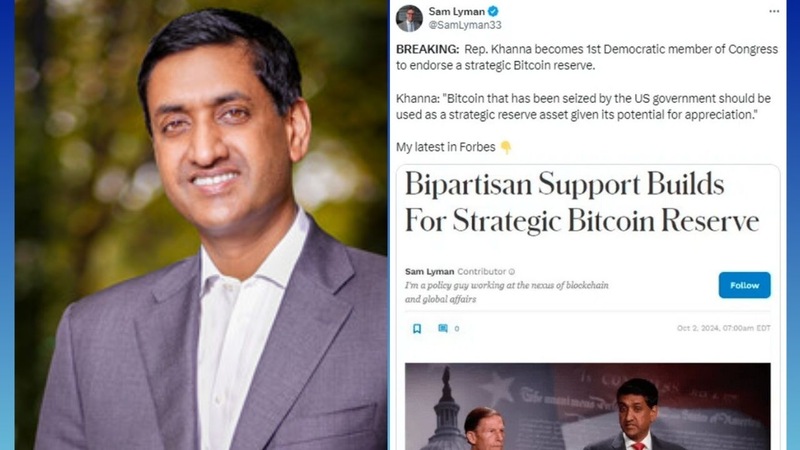Discover how cryptocurrency ro khanna is influencing cryptocurrency regulation in the U.S. Explore the implications of his recent comments, stakeholder concerns, and the future of crypto in this comprehensive analysis.
Background on Cryptocurrency regulation
Current state of Cryptocurrency regulation
Cryptocurrency regulation in the United States is a complex and evolving landscape characterized by a patchwork of state and federal laws. As of now, there is no unified regulatory framework governing cryptocurrencies, which creates confusion for investors, developers, and businesses operating within this sector. Various agencies, including the Securities and Exchange Commission (SEC), the Commodity Futures Trading Commission (CFTC), and the Financial Crimes Enforcement Network (FinCEN), have issued guidance that varies in interpretation and enforcement.
In recent years, the rapid growth of the cryptocurrency market has prompted increased scrutiny from lawmakers and regulators. High-profile incidents, such as the collapse of major exchanges and the rise of fraudulent Initial Coin Offerings (ICOs), have led to calls for stricter regulations to protect consumers and prevent market manipulation. However, these regulatory efforts have often been met with resistance from industry stakeholders who argue that overly stringent regulations could stifle innovation and hinder the growth of this burgeoning sector.

Importance of clear regulations
The necessity for clear regulations in the cryptocurrency market cannot be overstated. Transparent and consistent regulatory frameworks can foster innovation while protecting investors from potential risks associated with cryptocurrencies, such as volatility, fraud, and market manipulation. Well-defined regulations can help instill confidence among investors, encouraging them to participate in the market without fear of abrupt regulatory actions that could impact their investments.
Moreover, clear regulations can facilitate compliance for cryptocurrency businesses, allowing them to operate within legal boundaries without facing unexpected penalties or closures. This, in turn, can lead to increased investment and job creation within the industry, contributing to the overall growth of the economy. For a thriving cryptocurrency ecosystem, it is essential that policymakers collaborate with industry leaders to craft regulations that strike a balance between safeguarding consumers and promoting innovation.
Key challenges
Despite the potential benefits of regulatory clarity, several challenges remain. The rapid pace of technological advancement in the cryptocurrency space often outstrips the ability of regulators to keep up. This has led to a situation where laws may lag behind innovations, creating gaps in regulation. Additionally, the decentralized nature of cryptocurrencies complicates enforcement efforts, as transactions can occur across borders and outside traditional financial systems.
Furthermore, there is a notable divide in how different states approach cryptocurrency regulation. Some states, like Wyoming, have enacted friendly regulations to attract crypto businesses, while others have imposed strict rules that discourage development. This inconsistency can lead to confusion and a lack of confidence among investors and businesses.
Overall, the background on cryptocurrency regulation highlights a crucial moment in the industry’s evolution. With increasing calls for regulation, the involvement of key figures like Ro Khanna becomes essential in shaping a regulatory landscape that encourages growth while ensuring consumer protection.
Cryptocurrency Ro Khanna
Who is Ro Khanna?
Ro Khanna is an American politician and attorney serving as the U.S. Representative for California’s 17th congressional district since 2017. Here are some key details about him:

Early life and education
- Born on September 13, 1976, in Philadelphia, Pennsylvania, Khanna is of Indian descent.
- He graduated from the University of Chicago with a Bachelor’s degree in Economics and later earned a Juris Doctor from Yale Law School.
Political career
- Khanna began his political career in local government before running for Congress. He initially lost a primary election for California’s 17th district in 2014.
- In 2016, he won the Democratic primary and then the general election in 2017, defeating the incumbent, Mike Honda.
Policy positions
- Khanna is known for his progressive stances, advocating for issues such as universal healthcare, climate change action, and income inequality.
- He has a particular focus on technology and innovation, often discussing the need for regulations in the tech sector, including cryptocurrency.
Committee assignments
- He serves on the House Committee on Armed Services and the House Committee on Oversight and Reform.
- He has been involved in various initiatives related to technology and innovation, often emphasizing the need for responsible tech policies.
Cryptocurrency advocacy
- Khanna has emerged as a supporter of cryptocurrency and blockchain technology, calling for sensible regulations that balance innovation with consumer protection.
- He frequently engages with stakeholders in the crypto industry to promote dialogue between lawmakers and tech entrepreneurs.
Community engagement
- Khanna is known for his active engagement with constituents and efforts to bridge the gap between government and the tech industry, advocating for policies that support job creation and economic growth.
Overall, Ro Khanna is recognized as a prominent voice in Congress for technology-related issues, including the evolving landscape of cryptocurrency regulation.
Recent developments

On August 12, 2024, Ro Khanna took to social media to express optimism about upcoming regulatory changes. He noted that the Biden administration is expected to release a comprehensive regulatory roadmap for cryptocurrency in the coming weeks. This could not only help address concerns of the crypto community but also create an opportunity for cryptocurrency companies to operate in a clearer and more transparent environment.
Khanna participated in numerous meetings with industry leaders, including executives from prominent companies such as Coinbase and Ripple. These discussions focused on identifying key issues facing the industry, such as the need for a clear regulatory framework, how digital assets should be regulated, and consumer protection. He called for collaboration between regulators and the cryptocurrency community, stressing that effective regulation must come from mutual understanding and cooperation.
Khanna’s statements not only reflect his commitment to the cryptocurrency industry but also show a positive signal from the government towards innovation in this space. He emphasized that the sustainable development of cryptocurrency is indispensable in the digital era, and proper regulations will facilitate this development.
Implications of Khanna’s statements
Positive outlook for the Crypto industry
Khanna’s comments signal a potential shift in the administration’s approach to cryptocurrency regulation. By advocating for a regulatory framework that balances innovation and compliance, he aims to create an environment conducive to job creation and economic growth. The prospect of clear guidelines could encourage investment and innovation, ultimately benefiting the U.S. economy.
Concerns raised by industry leaders
Despite Khanna’s optimism, some industry leaders remain skeptical. Fred Thiel, CEO of Marathon Digital, has expressed concern about the lack of representation of Bitcoin miners in recent discussions. He has questioned whether this exclusion indicates a lack of government interest in Bitcoin mining. Similarly, Cardano founder Charles Hoskinson has criticized government hostility toward the cryptocurrency sector, warning that it could hinder future growth.
The role of stakeholders in shaping regulation
Engagement between government and industry
Effective cryptocurrency regulation cannot be achieved without close collaboration between governments and industry stakeholders. Active participation from crypto companies and influential organizations is essential to shaping policies that benefit both parties. Recent meetings between industry leaders, such as Ripple and Kraken, and government officials demonstrate a commitment to fostering this collaboration. These discussions not only help governments better understand the challenges facing crypto companies, but also provide an opportunity for stakeholders to be involved in the development of information regulations.
Influence of High-profile figures
The involvement of high-profile figures like Mark Cuban and Mike Novogratz adds weight to discussions about cryptocurrency regulation. These people not only have great influence in the community, but also have the ability to shape public perception of the industry. Using their platforms, they can advocate for supportive policies and regulations, thereby promoting a more favorable regulatory environment for innovation and growth. Their presence can create a wave of support in the community and promote positive changes from the government.

Community sentiment towards regulation
Skepticism vs. Optimism
The mood in the cryptocurrency community remains divided. Many are hopeful for positive regulatory changes following meetings between industry leaders and the government, but skepticism remains. Some in the industry feel that these reforms may not be enough to create real change. They point out that in the past, governments have introduced strict measures without full participation from industry insiders, resulting in regulations that do not match the realities of their operations.
Many in the community fear that the current optimism could lead to disappointment if new regulations fail to truly support innovation. This sentiment is evident in posts and discussions on social media, where individuals frequently express skepticism about the government’s commitment to fostering a cryptocurrency-friendly environment.
Calls for common-Sense approaches
Amidst this uncertainty, calls for a reset in the relationship between the crypto industry and the government are growing. JP Thieriot, director at Uphold, stressed the importance of showing openness from the government. He believes that adopting a reasonable approach will not only create a favorable atmosphere for cryptocurrency companies but also help increase public trust in new policies.
Many advocates argue that the government should work closely with industry experts to develop appropriate regulations. They assert that listening to voices from the crypto community will help authorities better understand the needs and challenges facing the industry, thereby making better decisions for all stakeholders.
In short, Ro Khanna has emerged as a strong advocate for the cryptocurrency industry, emphasizing the need for a clear regulatory framework. His recent statements not only give crypto companies hope, but also open the door for conversations that could shape the future of cryptocurrency regulation in the United States.
Continue to follow Blockchain Global Network to update the latest information on the Crypto investment market.

RELATED POSTS
Why Agenius ($AGNS) Could Lead the 2025 Crypto AI Agent Boom
Agenius ($AGNS) is at the...
Blockchain Technology News Update – HOT Trends for 2025
Blockchain technology news is abuzz...
Fuel Airdrop – Grab the opportunity to receive free Fuel tokens
The Fuel airdrop is an...
Examples of Secure Blockchain Implementations: Unveiling Industry Innovations
Examples of secure blockchain implementations...
Your essential guide to crypto conference events 2025
As the blockchain space matures,...
Naoris Protocol Airdrop: Get free NAORIS Tokens
Naoris Protocol is an advanced...
Kroma Airdrop Season 2 – Opportunity to Earn KRO and Explore Web3
Kroma Airdrop Season 2 is...
Sonic Labs Airdrop – Discover the Super HOT Token Burn Mechanism
One of the highlights of...
Binance Charity and the $1 Million USD Airdrop Campaign for Flood Relief
Binance Charity is a pioneer...
What is Airdrop in the Crypto World? Exploring Its Benefits and Risks
Curious about What is airdrop...
Define Blockchain Technology – A Beginner’s Introduction
Have you ever wondered what...
Helios consensus: The engine powering U2U Chain’s blockchain revolution
Ever wondered how U2U Chain...
Key blockchain developments expected by august 2025
As we look towards the...
AI Agents: Automation solutions for Web3 platforms
Artificial intelligence is ushering in...
What is polygon crypto – The Layer 2 Solution for Ethereum
What is polygon crypto? It...
dGEN1 Airdrop: Explore the opportunity to receive free Tokens
Discover the dGEN1 Airdrop, an...